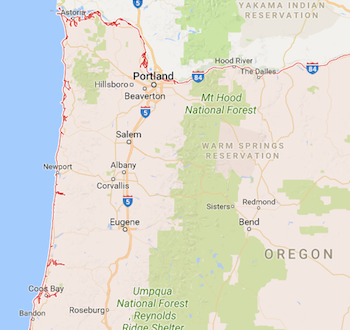Ironically, the first State in the US to impose a modern tax on the sale of bicycles is cycle-friendly Oregon. Portland in Oregon is one of America’s most bike friendly cities, and to the south Eugene is home to world-famous manufacturers such as Burley, Bike Friday, Rolf Prima and Co-motion.
Originally proposed to be a tax of 4 to 5 percent, Oregon’s legislature today passed an amended bill that will charge a flat tax of $15 on all new adult bicycles worth $200 and above. Bike shop owners have said the charge is a "sin tax" similar to the taxes on alcohol and tobacco, taxes which are imposed – in part – in order to reduce use.
Jonathan Maus, editor of Bike Portland, said "Take a deep breath and consider this: Oregon is now the only state in America with a bicycle excise tax."
The tax is part of a wider transportation bill and is expected to raise $1.2 million per year. It will cost $100,000 per year to administer, estimates Oregon’s Senate. (The bicycle tax has raised hackles but the rest of the transportation bill is progressive including, as it does, plans to introduce congestion charging, more money to be spent on public transport and zero spent on widening urban freeways.)
The funds raised from the bicycle tax will be set aside “for the purposes of grants for bicycle and pedestrian transportation projects … that expand and improve commuter routes for nonmotorized vehicles and pedestrians, including bicycle trails, footpaths and multiuse trails.”
The tax will be collected by bicycle retailers.
"We are taxing the healthiest, most inexpensive, most environmentally friendly, most efficient, and most economically sustainable form of transportation ever devised by the human species," mused Maus.
There was a great deal of opposition to the bill from bike organisations and cycle retailers before it passed, helping to switch it from a percentage to a flat charge. Twenty bike business owners sent a letter to Oregon’s lawmakers, urging the tax to be withdrawn.
“As Oregon businesses and taxpayers, we support a balanced transportation funding package that includes significant Safe Routes to School and bicycle investments, both on our roadways and on dedicated bike and pedestrian pathways," said the letter.
It continued: "As users of our transportation network, we embrace our role in helping pay for our transportation needs through the gas tax, vehicle registration fees, payroll tax, and other tax dollars, all of which we pay currently. However, we are concerned by discussion of a new bicycle excise tax, as we believe it would negatively affect Oregon’s bicycle industry.”
The letter stressed that many bike businesses operate on “slim profit margins with a fine line between success and failure” and that “a bicycle excise tax would have a negative impact both on bicycling and on our businesses.”
Bike Portland canvassed opinions from local bike shops and few had any good words to say about the bill.
"The more I think about it, the angrier it makes me," said Nathan Roll of Metropolis Cycle Repair.
"We already don’t make a ton of money off bike sales, and dealing with the cash flow and inventory issues stocking them creates means a tax might be the final straw that persuades me not to sell them at all, and instead concentrate on service and accessory sales."
Making a point about out-of-State and internet sales, he snarked: "I’m certain the legislature will be rigorously enforcing internet sales of bikes shipped to Oregon for tax enforcement, correct?"
Erik Tonkin of Sellwood Cycle Repair said: "I don’t really think taxing bikes is a good way to raise money for bike-specific infrastructure projects. For one thing, it just doesn’t seem like much revenue. Second, an excise often functions as a ‘sin tax’. Such taxes seem to work best when levied in order to discourage use. The gas tax and cigarette tax are there, in part, to discourage what are considered damaging and unhealthy activities. Smoking’s associated costs are health-care related. The one activity has impact on another entity – the tax is there to connect the activity to where it has its impact. It doesn’t seem wise to make bikes sinful when they can actually offset problems caused by driving cars."
Joe Doebele of Joe Bike was equally dismissive:
"The tax panders to a false assumption that a lot of people have: that cyclists don’t pay for the roads they ride on. Most cyclists have cars and pay all the taxes everybody else pays, yet the wear and tear they put on infrastructure when is much lighter. They’re also part of the solution to traffic congestion, especially when there’s separated infrastructure. In lending credence to a public misperception, they’re only going to ingrain the idea that cyclists should shoulder more and more of the burden. It fosters an us vs them mentality and may make drivers feel entitled to insist that cyclists “go ride somewhere else”. Instead, we should better educate the public about who pays taxes, who creates congestion, who damages the roads and bridges."
There are few places in the world which impose a specific tax on bicycles or which has successfully operated bicycle licensing systems (the costs generally outweigh the gains). However, it could be argued that one of the (many) reasons the Netherlands has been the world’s leading cycling nation since the 1920s is because of the "bicycle tax" that was imposed in 1924. (I discuss this tax in the Netherlands chapter of my new book, Bike Boom.)
This tax originally paid for flood defences and schools but was soon channeled to paying for cycle path construction and thereafter also paid for roads for motorists. In 1926, Dutch cyclists were paying more in to the Wegenfonds, or Road Fund, than motorists, and the national road-building plan of the following year was paid for mostly by cyclists.
The difference, of course, is that at the time there were far more cyclists in the Netherlands than motorists and they were so numerous that they could pay for grandiose infratructure building. In the US, then as now, cyclists are in a minority and the amounts raised by a modern "bicycle tax" will be relatively insignificant. At some point in the future a politician could argue that the only funds for cycling infrastructure buildin in the State should come from the "bicycle tax" – the amount raised per year won’t build much.
 BikeBiz Bicycle and cycling retail news
BikeBiz Bicycle and cycling retail news




